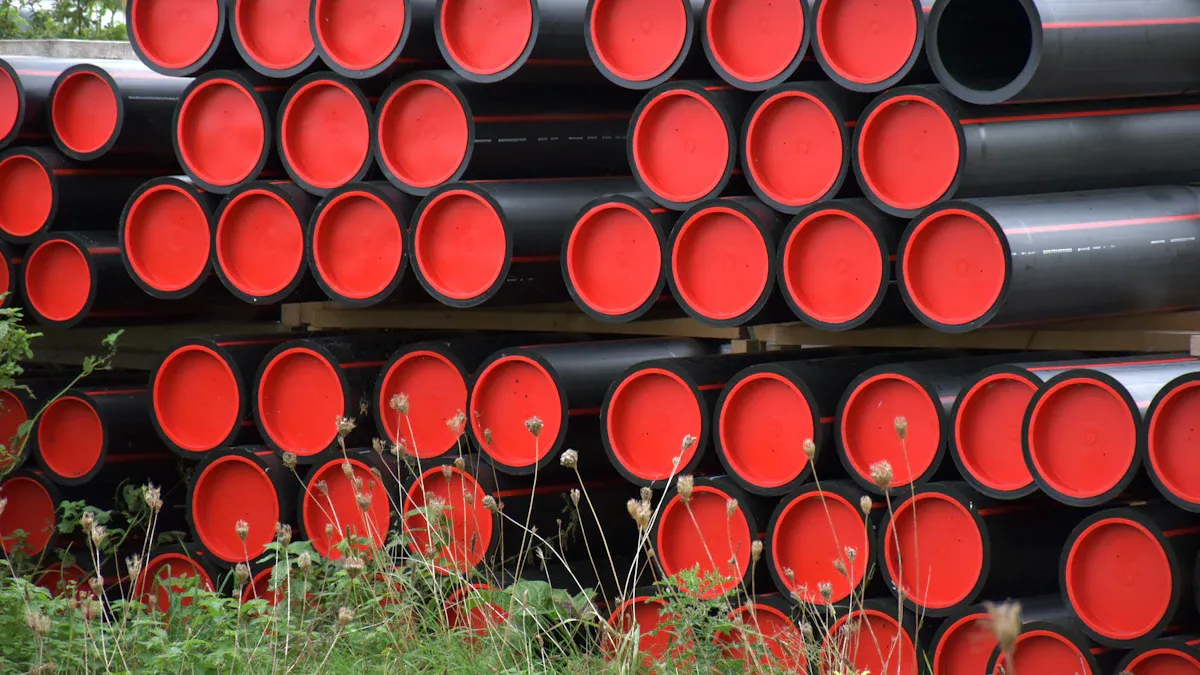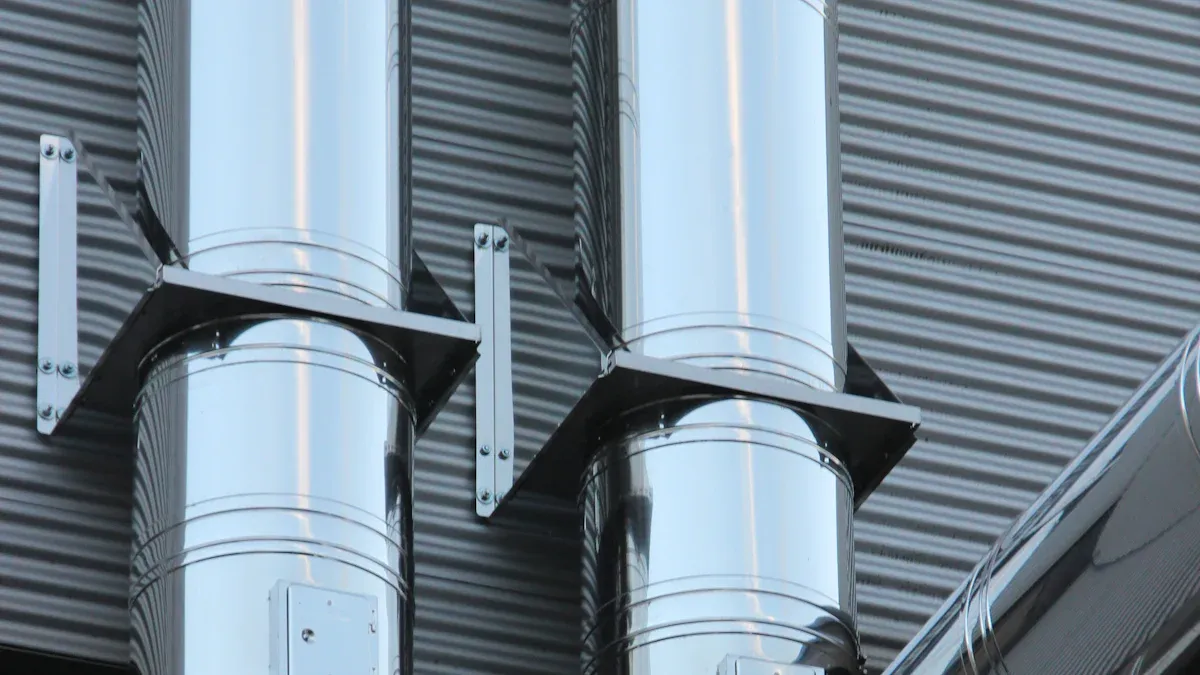
High-efficiency PVC pipe production systems are essential for delivering durable, reliable solutions in modern infrastructure. By incorporating advanced technologies like in-line radar-based measurement, manufacturers can reduce defects and enhance quality. Parallel twin screw systems play a pivotal role in optimizing production efficiency, ensuring consistent output. With ISO9001 certification, factories such as PVC pipe production parallel twin screw factories and PVC pipe single screw barrel factories uphold stringent quality standards, meeting global demands with confidence. Additionally, plastic extruder single screw barrel manufacturers contribute to the industry’s commitment to excellence.
High-Efficiency PVC Pipe Production

Key Features of High-Efficiency Production
High-efficiency PVC pipe production systems rely on advanced features to deliver consistent results. Automation stands out as a key driver, boosting production speed by 40-50%. Regular maintenance plays a vital role, reducing downtime by up to 30%. Staff training ensures smooth operations, enhancing overall efficiency. These features work together to create a streamlined manufacturing process that meets industry benchmarks.
| Key Feature | Impact on Efficiency |
|---|---|
| Automation | Increases production speed by 40-50% |
| Regular Maintenance | Reduces downtime by up to 30% |
| Staff Training | Enhances overall operational efficiency |
Parallel Twin Screw systems contribute significantly to these efficiencies. Their design optimizes material flow, ensuring uniformity and reducing waste. Manufacturers who adopt these systems often see improved production rates and lower operational costs.
Benefits of High-Efficiency Systems in PVC Pipe Manufacturing
High-efficiency systems offer tangible benefits that go beyond production speed. They reduce costs by improving resource utilization. Manufacturing Execution Systems (MES) have shown efficiency improvements of up to 25%, helping factories cut expenses. These systems also enhance product quality, ensuring pipes meet stringent standards.
- Cost reduction benefits include:
- Improved efficiency by 25% through MES.
- Lower waste and energy consumption.
Additionally, high-efficiency systems shorten customer order lead times, often delivering products within 24-72 hours. This quick turnaround builds trust and strengthens customer relationships. With features like automation and Parallel Twin Screw technology, manufacturers gain a competitive edge in the market.
Parallel Twin Screw Technology
Advantages of Parallel Twin Screw Systems
Parallel twin screw systems bring a host of advantages to PVC pipe production. Their design ensures precise control over material flow, which leads to consistent product quality. These systems excel at handling a wide range of materials, making them versatile for various manufacturing needs. By optimizing the mixing and melting processes, they reduce material degradation and improve the overall efficiency of production lines.
One of the standout features of these systems is their ability to maintain a uniform residence time distribution (RTD). This ensures that materials are evenly processed, minimizing defects and enhancing the final product’s durability. Factors like screw speed, feed rate, and barrel temperature play a crucial role in achieving this balance. Manufacturers can fine-tune these parameters to optimize production and address potential issues like material degradation.
Another key advantage is energy efficiency. Parallel twin screw systems consume less energy compared to traditional methods, which helps reduce operational costs. Their robust design also minimizes wear and tear, extending the lifespan of the equipment. This makes them a cost-effective choice for manufacturers looking to improve their production capabilities.
Applications in PVC Pipe Production
Parallel twin screw systems are widely used in PVC pipe production due to their reliability and efficiency. They are particularly effective in producing pipes with consistent wall thickness and smooth surfaces. This precision is essential for meeting industry standards and ensuring the pipes perform well in various applications, from plumbing to industrial use.
These systems are also ideal for processing high-performance PVC materials. They can handle formulations with additives like stabilizers, fillers, and plasticizers, ensuring uniform mixing and dispersion. This capability allows manufacturers to produce pipes with enhanced properties, such as increased strength, flexibility, or resistance to environmental factors.
In addition, parallel twin screw systems support high-speed production, enabling factories to meet tight deadlines without compromising quality. Their adaptability makes them suitable for both large-scale operations and specialized production lines. Whether it’s standard PVC pipes or custom designs, these systems deliver consistent results that manufacturers can rely on.
Tip: Investing in advanced parallel twin screw systems can help manufacturers stay competitive by improving efficiency and product quality.
ISO9001 Certification in Manufacturing
Overview of ISO9001 Certification
ISO9001 certification is a globally recognized standard for quality management systems. It provides a structured framework that helps manufacturers improve their processes, meet customer expectations, and comply with regulatory requirements. Companies that achieve this certification demonstrate their commitment to delivering consistent quality and reliability.
The certification process involves several key requirements:
- Documentation of the quality management system: Manufacturers must outline how their processes operate, including sourcing, training, and post-sale activities.
- Establishment of a quality management support system: A structured framework ensures that quality objectives are monitored effectively.
- Customer satisfaction tracking: Companies must implement systems to monitor customer feedback and address product defects.
- Quality objectives and tracking systems: Measurable goals help manufacturers track progress and improve operations.
- Product design controls: Structured approaches ensure that designs meet quality standards.
These requirements create a foundation for continuous improvement, helping manufacturers stay competitive in a dynamic market.
Role of ISO9001 in Ensuring Quality and Reliability
ISO9001 certification plays a crucial role in enhancing production quality and reliability. A study of 516 manufacturers in Thailand revealed that ISO9001 significantly improves lean manufacturing practices and supply chain relationships. These improvements directly impact production quality, ensuring that products meet stringent standards.
Manufacturers benefit from ISO9001 certification in several ways:
| Benefit | Description |
|---|---|
| Cost Savings | Reduces waste and inefficiencies, leading to lower operational costs. |
| Operational Excellence | Achieved through continuous monitoring and improvement of processes. |
| Competitive Edge | Certification makes organizations more attractive to potential clients and partners. |
| Enhanced Quality Management | Streamlines processes, leading to improved quality of products and services. |
| Increased Customer Satisfaction | Focuses on customer requirements, reducing errors and enhancing satisfaction. |
| Greater Operational Efficiency | Encourages optimization of operations, leading to cost savings. |
| Improved Employee Engagement | Employees understand their roles in delivering quality, leading to increased engagement. |
| Enhanced Marketability | Certification enhances reputation and expands market opportunities. |
| Continuous Improvement | Fosters an environment of continuous improvement, ensuring competitiveness. |
For PVC pipe manufacturers, ISO9001 certification ensures that products meet industry standards for durability and performance. Companies like TWTG Pipes have implemented ISO9001:2015 to align their quality policies with strategic goals. Internal audits and steering committees help maintain compliance, ensuring high product quality.
ISO9001 certification also supports risk-based thinking, which enhances operational resilience. By identifying potential risks early, manufacturers can address them proactively, reducing downtime and improving reliability. This approach is especially valuable for industries like PVC pipe production, where consistent quality is critical.
Note: Achieving ISO9001 certification not only boosts operational efficiency but also enhances customer trust. Manufacturers who invest in this certification position themselves as leaders in quality and reliability.
Synergy Between Parallel Twin Screw Systems and ISO9001 Certification
Enhanced Efficiency and Productivity
Combining Parallel Twin Screw systems with ISO9001 certification creates a powerful synergy that boosts efficiency and productivity. These systems streamline material processing, ensuring consistent flow and reducing waste. When paired with ISO9001’s structured process management, manufacturers can achieve smoother operations and faster production cycles.
For instance, ISO9001:2000 introduced integrated process management, emphasizing continual improvement and executive involvement. This aligns perfectly with the capabilities of Parallel Twin Screw systems, which optimize mixing and melting processes. Together, they help manufacturers reduce downtime and improve output quality.
Tip: Manufacturers can fine-tune parameters like screw speed and barrel temperature to maximize productivity while maintaining ISO9001 standards.
Consistent Quality Standards
The integration of Parallel Twin Screw systems and ISO9001 certification ensures consistent quality across production lines. These systems excel at maintaining uniform residence time distribution (RTD), which minimizes defects and enhances product durability. ISO9001 further enforces quality assurance through structured frameworks and regular audits.
A historical overview of ISO9001 highlights its evolution in maintaining quality:
| Standard | Focus | Key Changes |
|---|---|---|
| ISO 9001:1987 | Quality assurance in design and production | Introduced for companies creating new products. |
| ISO 9000:1994 | Emphasized preventive actions | Shifted focus from final inspection to process management. |
| ISO 9001:2000 | Integrated process management | Required executive involvement and continual improvement. |
This combination allows manufacturers to meet stringent industry standards while delivering reliable products.
Competitive Edge in the Market
Manufacturers leveraging Parallel Twin Screw systems and ISO9001 certification gain a significant competitive edge. These technologies not only enhance operational efficiency but also align with global sustainability goals. Companies like KraussMaffei Technologies GmbH use IoT capabilities for real-time monitoring, reducing downtime and improving predictive maintenance.
ISO9001 certification further strengthens marketability by ensuring compliance with industry standards. It compels manufacturers to continuously improve, making them more attractive to clients and partners. Additionally, customized solutions, like those offered by MISCHMASCH Maschinenbau GmbH, showcase how adaptability and quality can set companies apart in niche markets.
Note: Combining advanced technology with ISO9001 certification positions manufacturers as leaders in quality and innovation, helping them thrive in competitive markets.
High-efficiency PVC pipe production systems are vital for delivering reliable and durable products. Parallel twin screw technology enhances production processes by ensuring stable plasticization, high output, and low shearing force. ISO9001 certification guarantees consistent quality and reliability, making it a cornerstone for manufacturers aiming to excel.
| Benefit | Description |
|---|---|
| Long-term reliability | Ensures consistent performance, reducing downtime and maintenance costs. |
| High wear-resistant materials | Enhances durability, especially in demanding manufacturing environments. |
| Customization | Allows tailored solutions to meet specific operational needs. |
Manufacturers investing in ISO9001-certified systems gain long-term benefits like durability, efficiency, and competitive advantage. These systems deliver stable performance and a long service life, making them a smart choice for sustainable growth.
Tip: Choosing ISO9001-certified parallel twin screw systems ensures quality, reliability, and a strong market position.
FAQ
What makes parallel twin screw systems better than single screw systems?
Parallel twin screw systems offer better material mixing, higher output, and consistent quality. They also handle complex formulations more effectively, making them ideal for PVC pipe production.
Why is ISO9001 certification important for manufacturers?
ISO9001 certification ensures consistent quality and reliability. It helps manufacturers meet global standards, improve processes, and build trust with customers by delivering high-quality products.
Can high-efficiency systems reduce production costs?
Yes! High-efficiency systems optimize resource use, reduce waste, and lower energy consumption. These improvements lead to significant cost savings for manufacturers over time.
Tip: Investing in advanced systems and certifications boosts efficiency and strengthens market competitiveness.
Post time: May-07-2025
